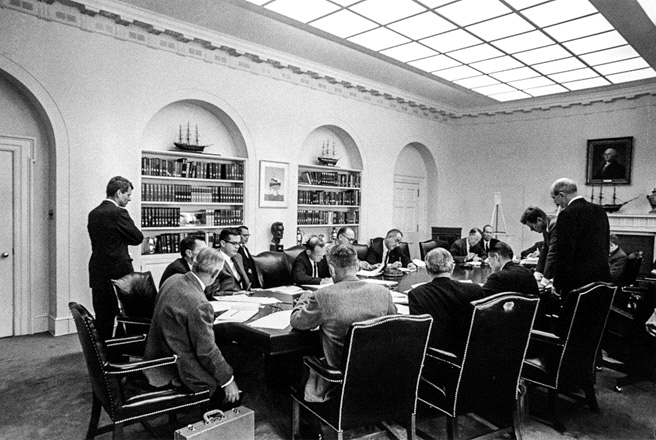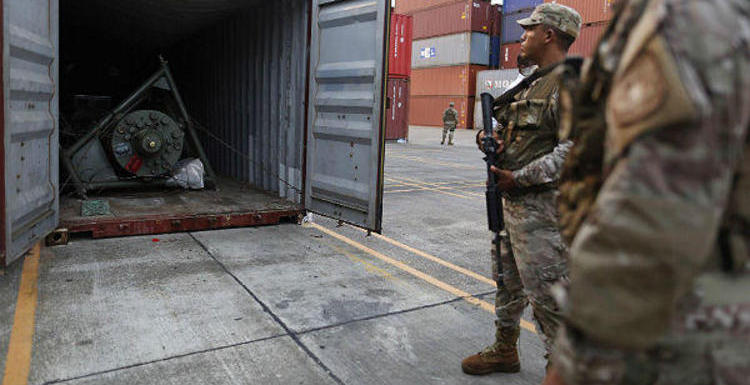Obama’s Sugar-Free Diplomacy: Administration Is Commendably Keeping Arms Shipment and Migration Talks Separate
On Monday, July 15, Panamanian authorities halted a North Korean-flagged ship and, upon inspection, discovered missiles and other military equipment hidden in a 10,000-ton Cuban shipment of brown sugar, prompting flights of speculation on the part of conservative media voices who nicknamed the incident the “Cuban Sugar Missile Crisis.” The search of the first cargo hold was conducted due to the existing U.N. sanctions regime against Pyongyang and suspicions that the vessel, the Chong Chon Gang, was transporting illegal drugs. On Tuesday, the Cuban Foreign Ministry took responsibility for the armaments aboard the ship, indicating that they were intended “to be repaired [in North Korea] and returned to our country.” [1] At the request of Panamanian authorities, the United Nations will launch a full investigation of the incident (projected to begin August 5) once the contents of the boat are fully unloaded. [2]
During Wednesday’s White House press briefing, Press Secretary Jay Carney was asked about the weapons shipment. After commending Panama’s action in stopping the ship, no doubt to the delight of Panamanian President Ricardo Martinelli, Carney appropriately relegated responsibility of the investigation to the United Nations, stating, “if it’s determined that materials found onboard that vessel violate sanctions, then the body that levied the sanctions, the United Nations, would handle enforcement matters.” [3] The Obama Administration’s reaction to this incident (or relative lack thereof) has thus far been appropriate in that it both respects U.N. sovereignty over this investigation and does not unfairly incriminate Cuba for its politically ill-advised attempt to modernize its defense capacities. If the United States continues to maintain a levelheaded approach to this issue over the course of the next few weeks and months, then perhaps U.S.-Cuban relations will not experience the crushing setback anticipated by many analysts as a result of this week’s explosive events.
Washington’s Varied Reactions to the Interception Incident
It is encouraging that, at least for now, the United States has shown no intention of cutting off bilateral negotiations with Cuba. The events in question inconveniently occurred the day before scheduled migration talks between Washington and Havana were slated to begin. However, to the dismay of the anti-Castro lobby and prominent Cuban-American politicians like Congresswoman Ileana Ros-Lehtinen (R-FL), former chair of the House Committee on Foreign Affairs, the migration talks were not postponed nor suspended. [4] According to a press statement released on Wednesday by the Cuban delegation to the talks, “the meeting took place in a climate of respect.” [5] These are the first bilateral migration talks to occur between the two countries since January 2011 and could represent a significant step forward for U.S.-Cuban relations if they prove to be successful.

Predictably, some anti-Castro members of Congress have used this ongoing debacle as a political tool to call for a rollback of U.S.-Cuban relations. On Tuesday, before Cuba had even released any statement about the weapons on board the Chong Chon Gang, Ros-Lehtinen called for the Obama Administration to see the arms shipment situation as a “wakeup call” and cease its engagement with the Castro government, which would include suspending the aforementioned migration talks. [6] On Wednesday, Senator Robert Menendez (D-NJ), chair of the Senate Committee on Foreign Relations, requested that the Obama Administration submit the incident to the U.N. Security Council for review. He also used the event as justification for the assertion that Cuba should continue to be listed as a State Sponsor of Terrorism—which is an unfounded designation to begin with. [7] In a similar vein, Senator Marco Rubio (R-FL) sent a letter to Secretary of State John Kerry lambasting the Cuban government for its involvement in the incident and going as far as urging Washington to “immediately reverse its January 2011 decision easing restrictions on people-to-people travel and remittances sent to Cuba; as well as immediately halt granting visas to Cuban government officials.” [8] Such inflammatory comments do little in terms of dictating a rational response to the interception incident, while simultaneously pressuring the Obama Administration to reverse the modest positive changes it has implemented with regards to U.S.-Cuban relations.
Washington’s (thus far) subdued reaction to the incident differs significantly from the U.S. reaction to the internationally condemned February 1996 shooting of two Brothers to the Rescue planes by Cuban air force pilots. At the time of the shooting, Congress was debating landmark legislation, the Helms-Burton Act, regarding the Cuban embargo, making the incident highly ill-timed for Cuba. The legislation, which was passed in large part due to the shooting, served as a method of punishing the Cuban government by institutionalizing the U.S. embargo against Cuba. Under Helms-Burton, “no president can lift or even relax the embargo until Fidel Castro and the existing Cuban regime fall from power.” [9] While this week’s gaffe was obviously motivated less by anti-U.S. sentiment in Havana and more by Cuba’s economic and defensive deficiencies, and did not involve any overt aggressiveness, the fact that the United States has not harshly condemned nor castigated Cuba for its actions may be symbolic of the decreasing bellicosity of the normally volatile relationship between the two countries.
Assessing the Threat Posed by the Arms Shipment
Although the arms shipment to North Korea was certainly a significant miscalculation by Havana, it does not in any way represent a bona fide threat to Washington’s or Panama’s national security. As the Cuban Foreign Ministry stated, the missiles and other material are “obsolete.” [10] The mid-century Soviet-designed weapons identified so far include “two anti-aircraft missile batteries, nine disassembled missiles, two MiG-21 aircraft, and 15 MiG engines.” [11] These weapons, in addition to being woefully out of date, are primarily defensive in nature. Thus, even if repaired, they are neither a threat to the United States nor related to the principle goal of the international sanctions regime against arms shipments to North Korea, which aims to prevent the East Asian nation from acquiring nuclear capabilities and ballistic missiles. [12]
Havana’s collaboration with Pyongyang is troubling (although most likely driven by economic considerations rather than a desire to collaborate with the ostracized regime), but the Obama Administration should not be worried about Cuba’s understandable desire to modernize its military technology. After all, the U.S. Department of Defense has considered the Cuban military “a negligible threat” to the United States and the rest of the hemisphere for over a decade. [13] Thus, the issue of concern is the ongoing cooperation between Havana and Pyongyang despite the U.N. sanctions and Cuban assurances that it is committed to nuclear disarmament. More troubling than the antiquated weapons themselves is the fact that Cuba has bothered to attempt to covertly trade with North Korea at least once, and that this trade attempt included a shipment of military equipment banned by the U.N. sanctions regime. Regardless of its legality, the ship’s cargo in no way poses a security threat to the United States. Consequently, the Obama Administration’s reasoned and patient response to the incident may reflect an understanding of the true nature of the “threat” and the need for continued engagement with Havana.

Hardly a Twenty-First Century Cuban Missile Crisis
Though the moniker the “Cuban Sugar Missile Crisis” may superficially appear to draw logical comparisons to the 1962 Cuban Missile Crisis, the radically different contexts in which the two incidents occurred should be taken into account. In 1962, Cuba was the installation site of Soviet missiles capable of reaching the United States, meaning that a clear and present danger existed. The ongoing proceedings involving North Korea are clearly of an entirely different breed, as the missiles in question are anachronistic and could not be used to attack the United States. Thus, President Barack Obama’s current strategy of waiting for the completion of the U.N. inspection before listening to the cacophony of anti-Cuban voices could be compared to former President John F. Kennedy’s calm and measured response to the much more pivotal 1962 crisis in the face of calls for decisive military action on the part of the Joint Chiefs of Staff. President Obama should continue to channel Kennedy’s composure and maintain an open and respectful dialogue with the Cuban government as the two nations contend with such complex issues as the arms shipment and the migration talks.
Rebecca Lullo and Phineas Rueckert, Research Associates at the Council on Hemispheric Affairs
Please accept this article as a free contribution from COHA, but if re-posting, please afford authorial and institutional attribution. Exclusive rights can be negotiated.
For additional news and analysis on Latin America, please go to: LatinNews.com and Rights Action
References
1. “Statement from the Ministry of Foreign Affairs,” Granma, July 16, 2013, http://www.granma.cu/ingles/cuba-i/17jul-Statement.html.
2. José de Córdoba and Joe Lauria, “U.N. Team to Inspect Ship in Panama,” Wall Street Journal, July 19, 2013, http://online.wsj.com/article/SB10001424127887324263404578614310911760752.html.
3. “Press Briefing by Press Secretary Jay Carney, 7/17/2013,” The White House, July 17, 2013, http://www.whitehouse.gov/the-press-office/2013/07/17/press-briefing-press-secretary-jay-carney-7172013.
4. “Ship Caught with Missile Equipment Headed to North Korea from Cuba Needs to Serve as Wake Up Call to Obama Administration, Ros-Lehtinen Says,” Congresswoman Ileana Ros-Lehtinen, July 16, 2013, http://ros-lehtinen.house.gov/press-release/ship-caught-missile-equipment-headed-north-korea-cuba-needs-serve-wake-call-obama.
5. “Press statement released by the Cuban delegation to the round of migration talks with the United States,” Granma, July 17, 2013,
http://www.granma.cu/ingles/cuba-i/18jul-statement.html.
6. “Ship Caught.”
7. “Chairman Menendez Statement on Cuban Weapon Transfers to North Korea,” Senator Robert Menendez, July 17, 2013, http://www.menendez.senate.gov/newsroom/press/chairman-menendez-statement-on-cuban-weapon-transfers-to-north-korea.
8. “Senator Marco Rubio to Secretary of State John Kerry,” Senator Marco Rubio, July 17, 2013, http://www.rubio.senate.gov/public/index.cfm/files/serve/?File_id=98228377-cbd4-4be9-8c10-b4f7830d224a.
9. William M. LeoGrande, “Enemies Evermore: US Policy Towards Cuba After Helms-Burton,” Journal of Latin American Studies 29 (1997): 211-221, http://www1.american.edu/faculty/leogrande/JLAS-Enemies_Evermore.pdf.
10. “Ministry of Foreign Affairs.”
11. David Adams, “Analysis: Ship Seizure Shows Dire Straits of Cuban Military Rather than Threat,” Reuters, July 17, 2013, http://www.reuters.com/article/2013/07/18/us-panama-northkorea-cuba-weapons-analys-idUSBRE96H01G20130718.
12. Ibid.
13. Ibid.


